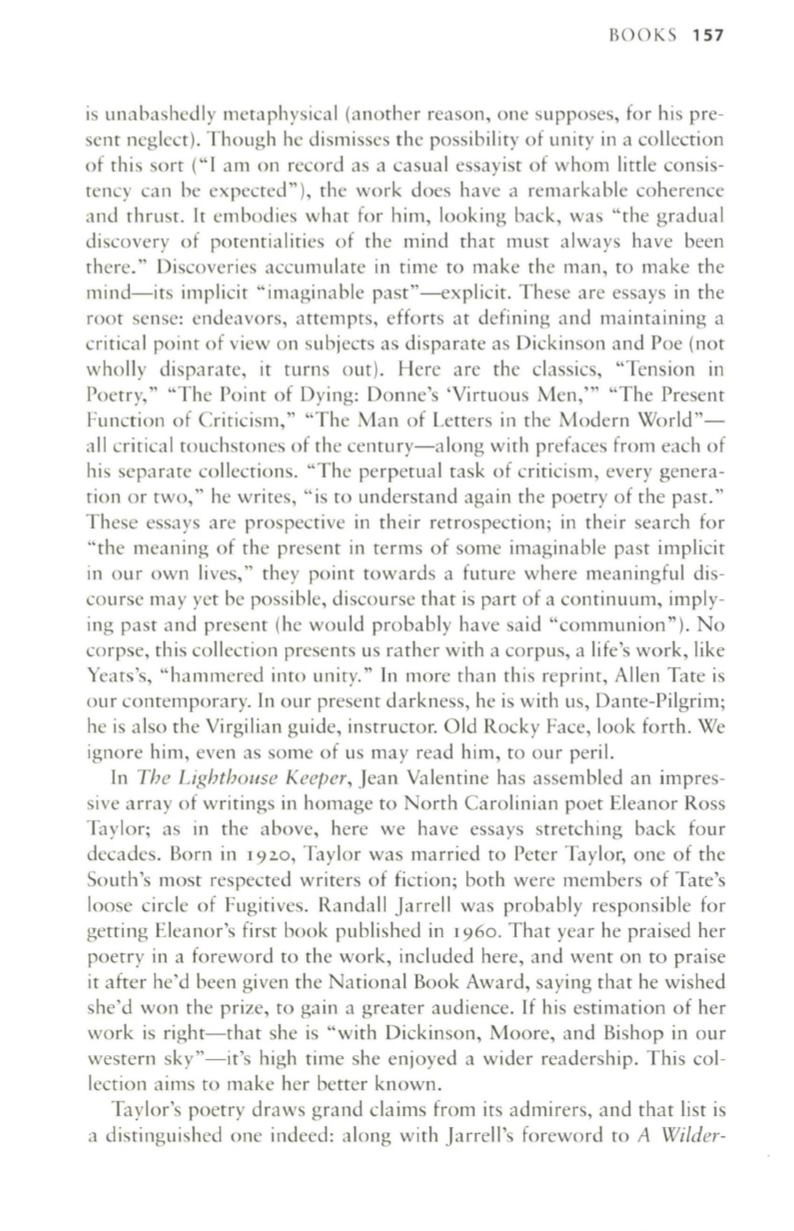
BOOKS
157
is unabashedly metaphysical (another reason, one supposes, for his pre–
sent neglect). Though he dismisses the possibility of unity in a collection
of this sort ("I am on record as a casual essayist of whom little consis–
tency can be expected"), the work does have a remarkable coherence
and thrust.
It
embodies what for him, looking back, was "the gradual
discovery of potentialities of the mind that must always have been
th ere." Discoveries accumulate in time to make the man, to make the
mind-its implicit "imaginable past"-explicit. These are essays in the
root sense: endeavors, attempts, efforts at defining and maintaining a
critical point of view on subjects as disparate as Dickinson and Poe (not
wholly disparate, it turns out). Here are the classics, "Tension in
Poetry," "The Point of Dying: Donne's 'Virtuous Men,'" "The Present
Function of Criticism," "The Man of Letters in the Modern World"–
all critical touchstones of the century-along with prefaces from each of
his separate collections. "The perpetual task of criticism, every genera–
tion or two," he writes, "is to understand again the poetry of the past."
These essays are prospective in their retrospection; in their search for
"the meaning of the present in terms of some imaginable past implicit
in our own lives," they point towards a future where meaningful dis–
course may yet be possible, discourse that is part of a continuum, imply–
ing past and present (he would probably have said "communion"). No
corpse, this collection presents us rather with a corpus, a life's work, like
Yeats's, "hammered into unity." In more than this reprint, Allen Tate is
our contemporary. In our present darkness, he is with us, Dante-Pilgrim;
he is also the Virgilian guide, instructor. Old Rocky Face, look forth. We
ignore him, even as some of us may read him, to our peril.
In
The Lighthouse Keeper,
Jean Valentine has assembled an impres–
sive array of writings in homage to North Carolinian poet Eleanor Ross
Taylor; as in the above, here we have essays stretching back four
decades. Born in
1920,
Taylor was married to Peter Taylor, one of the
South's most respected writers of fiction; both were members of Tate's
loose circle of Fugitives. Randall Jarrell was probably responsible for
getting Eleanor's first book published in
1960.
That year he praised her
poetry in a foreword to the work, included here, and went on to praise
it after he'd been given the National Book Award, saying that he wished
she'd won the prize, to gain a greater audience.
If
his estimation of her
work is right-that she is "with Dickinson, Moore, and Bishop in our
western sky"-it's high time she enjoyed a wider readership. This col–
lection aims to make her better known.
Taylor's poetry draws grand claims from its admirers, and that list is
a distinguished one indeed: along with Jarrell's foreword to
A Wilder-


